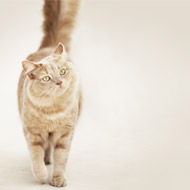Carbapenem-resistant Salmonella found in cat

Researchers studying the resistant strain believe it could pose a serious public health threat. (Stock photo)
A strain of Salmonella that is resistant to carbapenems has been discovered for the first time in a domestic cat in Australia.
Carbapenems are used as the last line of defence in Australian hospitals. Researchers studying the resistant strain believe it could pose a serious public health threat.
Dr Sam Abraham from Murdoch University in Perth, who led the research, said: "This is the first time that a Salmonella strain with resistance to most antimicrobial drugs has been reported in any Australian domestic animal and it is a significant concern to public health."
The strain was discovered by chance when the cat was admitted to Concord Veterinary Clinic in New South Wales with an upper respiratory tract infection. It developed a gut infection during its treatment and veterinary surgeon Dr David Hughes took the precaution of sending a sample to Professor Thomas Gottlieb's research team at Concord Hospital.
Prof Gottlieb said: "Initial analysis of the Salmonella gave results that had never before been seen for this bacterium in Australia. We found that the cat been infected with a Salmonella bacteria carrying the highly resistant IMP-4 gene."
Experts from the University of Sydney and Concord Hospital assisted with the containment of the outbreak. A further eight cats at the veterinary clinic were tested - of which three were also found to be carrying the bacteria.
One had no symptoms, one had been kept in the same room as the sick animal but had not had direct contact with it, and the third had been kept in a different room at the clinic. Dr Richard Malik from the University of Sydney said the outbreak was well contained but the positive results from the other cats suggests the bacterial species "may be highly transferrable".
The sample was sent to Dr Abraham and Dr Mark O'Dea at Murdoch University to explore the source and characteristics of the bacteria.
"This level of antimicrobial resistance in domesticated animals has not been seen before in Australia although it has been recorded in birds within a seagull colony off New South Wales," Dr Abraham explained. "We are not sure how these birds were infected, and we are not ruling out the possibility of such resistant bacteria occurring in the natural environment."
Another theory is that the bacteria's resistance has been built up through exposure to heavy metal.
While the resistant DNA plasmids found in the Salmonella are similar to that reported in hospitals in the eastern states, Dr Abraham said this DNA and associated critical drug resistance has never before been seen in a zoonotic pathogen in Australia.
The research paper will be published in the journal Scientific Reports.



 RCVS Knowledge has welcomed Professor Peter Cockcroft as editor-in-chief for Veterinary Evidence.
RCVS Knowledge has welcomed Professor Peter Cockcroft as editor-in-chief for Veterinary Evidence.